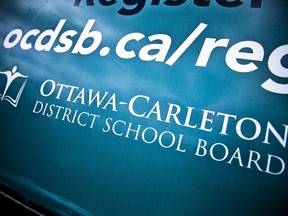Education
Ottawa School Board Spends 25% More on Special Education

A recent report presented to the audit committee of the Ottawa-Carleton District School Board (OCDSB) revealed that the board spends over 25 percent more on special education than it receives from the provincial government. This financial discrepancy underscores a significant commitment to supporting students, despite persistent budget constraints.
The Ontario East Regional Internal Audit Team, which conducts independent evaluations of school boards, highlighted the board’s notable strengths in its approach to special education funding. Audit committee chair Donna Blackburn remarked that the findings should prompt consideration from Bob Plamondon, who was appointed as the board’s supervisor on June 27, 2023. Blackburn noted, “These are accountants. They have no political motivation. They just look at facts. We are underfunded. They said it.”
Plamondon, who has extensive experience in governance and auditing, was appointed by the province in response to concerns regarding financial mismanagement and rising deficits. In a communication to families dated August 27, 2023, Education Minister Paul Calandra emphasized that Plamondon would work towards balancing the board’s budget and ensuring long-term financial stability aimed at directing funding to classrooms.
The audit report compared OCDSB’s spending on special education to other similar boards in the region, revealing that many school boards outlay more than they receive from province-allocated funds. The report indicated that the OCDSB allocates a substantial portion of its budget to special education, positioning it among the highest spenders per pupil in the area. Approximately 54 percent of all elementary special education students within the board were placed in fully self-contained classes during the 2022-23 school year.
While the report recognized the board’s commendable investment in special education, it also pointed to a potential drawback. The heavy reliance on self-contained classes may restrict opportunities for inclusive education. Blackburn clarified that the inclusion of two specialized schools, Crystal Bay and Clifford Bowey, which cater to students with developmental disabilities, contributes to this statistic. Together, these schools serve around 200 students from across the city, and Blackburn emphasized the importance of honoring these students’ rights to education.
The audit further disclosed that the OCDSB invests more in its gifted program compared to most regional schools, many of which do not offer such programs. Nonetheless, other Ontario school boards, including the Durham District School Board and the Dufferin-Peel Catholic District School Board, allocate a higher proportion of their budgets to gifted programs. This program, while beneficial, falls under the umbrella of special education but is not mandated by the province.
Trustees have been aware of the ongoing financial challenges, with previous discussions indicating that the board incurs approximately $10 million more in annual spending for special education than it receives from the province. This has led to proposed cuts, including a $3.8 million reduction in staffing for special education, which would affect learning support assistants and various specialist roles.
An emotional debate also arose regarding the potential elimination of a summer program for students with developmental delays and autism, which, while not mandated, has been a recurring target for budget cuts. Due to the board being under provincial supervision, trustees are currently unable to make decisions independently.
Plamondon has publicly addressed the challenges facing the OCDSB, stating that the board needs to refocus on fundamental educational principles to restore trust and bolster student enrollment. He remarked, “Supervision is not just a change in governance — it’s an opportunity to move quickly and make the positive changes our students need and deserve.”
As the OCDSB navigates these financial hurdles, the findings from the audit serve as both an assessment of its current practices and a call to action for future improvements in special education support.
-

 Education4 months ago
Education4 months agoBrandon University’s Failed $5 Million Project Sparks Oversight Review
-

 Science5 months ago
Science5 months agoMicrosoft Confirms U.S. Law Overrules Canadian Data Sovereignty
-

 Lifestyle5 months ago
Lifestyle5 months agoWinnipeg Celebrates Culinary Creativity During Le Burger Week 2025
-

 Health5 months ago
Health5 months agoMontreal’s Groupe Marcelle Leads Canadian Cosmetic Industry Growth
-

 Science5 months ago
Science5 months agoTech Innovator Amandipp Singh Transforms Hiring for Disabled
-

 Technology5 months ago
Technology5 months agoDragon Ball: Sparking! Zero Launching on Switch and Switch 2 This November
-

 Education5 months ago
Education5 months agoNew SĆIȺNEW̱ SṮEȽIṮḴEȽ Elementary Opens in Langford for 2025/2026 Year
-

 Education5 months ago
Education5 months agoRed River College Launches New Programs to Address Industry Needs
-

 Business4 months ago
Business4 months agoRocket Lab Reports Strong Q2 2025 Revenue Growth and Future Plans
-

 Technology5 months ago
Technology5 months agoGoogle Pixel 10 Pro Fold Specs Unveiled Ahead of Launch
-

 Top Stories4 weeks ago
Top Stories4 weeks agoCanadiens Eye Elias Pettersson: What It Would Cost to Acquire Him
-

 Technology3 months ago
Technology3 months agoDiscord Faces Serious Security Breach Affecting Millions
-

 Education5 months ago
Education5 months agoAlberta Teachers’ Strike: Potential Impacts on Students and Families
-

 Business1 month ago
Business1 month agoEngineAI Unveils T800 Humanoid Robot, Setting New Industry Standards
-

 Business5 months ago
Business5 months agoBNA Brewing to Open New Bowling Alley in Downtown Penticton
-

 Science5 months ago
Science5 months agoChina’s Wukong Spacesuit Sets New Standard for AI in Space
-

 Lifestyle3 months ago
Lifestyle3 months agoCanadian Author Secures Funding to Write Book Without Financial Strain
-

 Business5 months ago
Business5 months agoNew Estimates Reveal ChatGPT-5 Energy Use Could Soar
-

 Business3 months ago
Business3 months agoHydro-Québec Espionage Trial Exposes Internal Oversight Failures
-

 Business5 months ago
Business5 months agoDawson City Residents Rally Around Buy Canadian Movement
-

 Technology5 months ago
Technology5 months agoFuture Entertainment Launches DDoD with Gameplay Trailer Showcase
-

 Top Stories4 months ago
Top Stories4 months agoBlue Jays Shift José Berríos to Bullpen Ahead of Playoffs
-

 Technology5 months ago
Technology5 months agoWorld of Warcraft Players Buzz Over 19-Quest Bee Challenge
-

 Top Stories3 months ago
Top Stories3 months agoPatrik Laine Struggles to Make Impact for Canadiens Early Season










